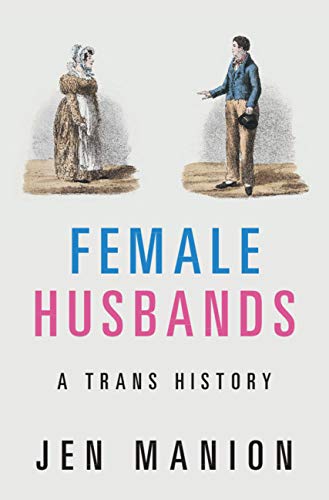Jen Manion, Female Husbands: A Trans History. Cambridge: Cambridge University Press, 2020. ISBN: 9781108652834, 350pg. $24.95USD.
By Julia Ftacek
 Jen Manion’s Female Husbands: A Trans History begins with two radical claims. The first, that “[female husbands] demonstrated by their actions every day that gender was malleable and not a result of one’s sex,” challenges a body of eighteenth and nineteenth century scholarship that—while readily embracing sexuality as a site of queerness—too often takes for granted the variety of gender that existed historically. The second claim, that they found “joy and love” in their marriages and occupations, is no less radical for the way that it humanizes and affirms its subjects (1-2). It is here where Manion’s book excels. Drawing primarily from newspaper accounts as well as court records, popular broadsides, political treatises, and more, Manion examines in great detail the lives of many people assigned female at birth who in some way “transed gender,” most oftentimes presenting themselves and living as men, and at others time taking on a gender fluid expression that Manion portrays as every bit as complex and nuanced as any modern day queer gender. Female Husband portrays its subjects as having fulfilling lives, engaging in skilled labor, entering loving marriages, running successful businesses, and so on as they navigated the challenging mores of gender and sexuality in their own time.
Jen Manion’s Female Husbands: A Trans History begins with two radical claims. The first, that “[female husbands] demonstrated by their actions every day that gender was malleable and not a result of one’s sex,” challenges a body of eighteenth and nineteenth century scholarship that—while readily embracing sexuality as a site of queerness—too often takes for granted the variety of gender that existed historically. The second claim, that they found “joy and love” in their marriages and occupations, is no less radical for the way that it humanizes and affirms its subjects (1-2). It is here where Manion’s book excels. Drawing primarily from newspaper accounts as well as court records, popular broadsides, political treatises, and more, Manion examines in great detail the lives of many people assigned female at birth who in some way “transed gender,” most oftentimes presenting themselves and living as men, and at others time taking on a gender fluid expression that Manion portrays as every bit as complex and nuanced as any modern day queer gender. Female Husband portrays its subjects as having fulfilling lives, engaging in skilled labor, entering loving marriages, running successful businesses, and so on as they navigated the challenging mores of gender and sexuality in their own time.
Female Husbands takes on a somewhat unique form, serving more as an anthology of its subjects’ lives and stories than as a traditional monograph organized by theme or topic. Scholars looking for deep examinations of terms and concepts may initially find this layout frustrating, as Manion tends to spread more complex discussions of transgender terminology and queer theoretical concepts across the many entries rather than neatly collected under clearly defined sections. The result is a book that is eminently readable as a whole, with a steady drip-feed of complex analysis within its more narrative sections that readers across disciplines and specialties will find accessible. This layout has the additional benefit of providing a holistic look at each subject’s life and story, and a more complete picture of the gendered contexts and histories they inhabited. Readers may be familiar with some of these subjects, particularly in the “Sailors and Soldiers” section, where Manion contextualizes their perhaps less known subjects against the more popular contemporaneous sailor narratives, such as that of James Gray (known more commonly as Hannah Snell), that endure to this day. Arranged roughly chronologically, Manion’s approach to their subjects reminds readers that those who transed gender existed within a kind of heritage and tradition despite the seemingly singular and spectacular nature of their experiences. Indeed, Female Husbands challenges the spectacular framing of the titular husbands by contemporaneous material over and over, examining the shared tropes and cultural anxieties that animated these accounts so as to call their veracity into question. In doing so, Manion builds a framework for examining transness and narrative tropes surrounding transness both historically and in the modern day. To underscore this, Female Husbands ends with a look at “The First Female-To-Male Transsexual,” highlighting the ways in which modern transness is just another point in a long history of gender transgression.
Writing about transness before the invention of the language to describe transness is a difficult task that Manion tackles with great skill. The history of female husbands is a complex one, and Manion is firm in their assertions that these experiences can be read as trans, however ambiguously, while also acknowledging the ways that female husbands have played a role in cisgender lesbian history and the history of women’s rights broadly conceived. Female Husbands thus acts less as a corrective to a field that has at times ignored trans history and more as a broadening of possibilities, inviting readers to consider the lives and experiences of people who exist beyond the scope of normative gender then and now.
Julia Ftacek (she/her) is a PhD candidate in English literature at Western Michigan University. Her scholarship focuses on transgender femininity in the long eighteenth century, with a particular emphasis on the work of Jonathan Swift.







